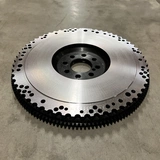Different types of fuel

Information about fuel types such as Gasoline, Ethanol, Methanol, Diesel and a little about racing fuel and what it is. But we have also included information on fuel additive to give a good idea of why this is used.
We categorize different fuel types as below and get started!
- Gasoline
- Ethanol
- Methanol
- Diesel
- Racing fuel
- Fuel additives
Stoichiometric mixture = Optimal fuel mixture = Lambda 1
1 ▼
Gasoline
Lambda 1 for gasoline = AFR 14,7
Gasoline is the most common fuel for passenger cars, but also in the aftermarket for rebuilt, tuned cars and racing cars. It is a safe choice that is proven. Racing fuel is often based on petrol with additives that give higher octane, better lubrication and other properties suitable for a racing car. Gasoline has a stoichiometric mixture of 1:14.7 This means 1 part fuel and 14.7 parts air to have the optimal combustion. This is where ethanol comes into play.
2 ▼
Ethanol
Lambda 1 for E85 = AFR 9,76 and for E100 = 8,98
Ethanol was initially an environmental fuel, but the aftermarket quickly caught on and started using this as "racing fuel". This is because the ethanol has a stoichiometric mixture of 1:9.76, which means 1 part fuel and 9.76 parts air for optimal combustion. In short, more fuel is used, which provides more energy for combustion, even though ethanol is less energy-rich compared to an equal amount of gasoline.
Ethanol also has a higher octane content, which prevents knocking.
3 ▼
Methanol
Lambda 1 for Metanol = AFR 6,46
Methanol is most common in drag racing but also other motor sports where the heats are not that long. An example could be formula offroad. Often a type of racing methanol is used in competitions.
4 ▼
Diesel
Lambda 1 for Diesel = AFR 14,5
Diesel is mostly used in work vehicles but now also in passenger cars. This is not used as widely on tuned engines until now. More and more people have chosen to use diesel engines in their tuned car. Diesel systems require different knowledge and safety as systems with diesel can reach up to 2000 bar and sometimes even more.
5 ▼
Racing fuel
Lambda 1 for racing fuel depends on manufacturer and octane rating.
Racing fuel is a high octane fuel. Higher octane gives higher resistance to early detonation. This is bad for the engine and occurs when cylinder pressure och temperature is too high and ignites the fuel too early, -before the spark plug ignites the fuel/air mixture.
Higher octane gives higher resistance to knocking. Knocking is bad for the engine and occurs when too high pressure or temperature ignites the fuel too early, -before the spark plug ignites the fuel/air mixture.
6 ▼
Fuel additives
When using fuel such as Ethanol, for example, an additive (fuel additive) may be necessary to reduce wear on the moving parts in the fuel system. This additive is purchased separately from the fuel itself and added to the fuel tank. When using petrol, this is not necessary. But when using e.g. Ethanol, it is more or less a must to avoid problems.
A problem that arises over time is deposits that clog filters, injectors and intakes / runners. For example, the characteristics of the injectors can change, fuel filters flow less and intake manifolds become dirty from these deposits that come from ethanol.
Ethanol is also called an aggressive fuel. It is because that it is "dry", it does not lubricate like gasoline does. Above all, fuel pumps are negatively affected and wear out faster due to poor lubrication. This is another reason why you should use additives with this fuel. New fuel pumps have arrived that are supposed to cope with ethanol, but it is not a solution to the problem, - it is an improvement of the problem. But the problem remains and fuel additive must still be used for Ethanol.
▼
▼
-
Fuel system
- Fuel system: Components and assembly
- Fuel system: Common problems
- Choose the correct fuel injector
- Check valve - Information
- Compare Fuel injectors
- Different Type of Fuels [Gasoline or Ethanol?]
- Different types of fuel systems
- Fuel catch tank / Fuel surge tank
- Fuel cell
- Fuel filter
- Fuel pressure regulator
- Fuel pump
- Fuel Pump Hanger - Information
- Fuel rail - Information
- Injector flow - Horsepower rating
- Injector size
- Tank ventilation / Roll over valve











































